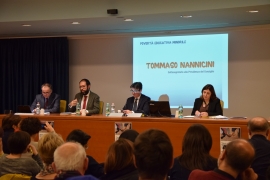Among Italian fifteen-year-olds, one out of every four does not pass the minimum level of mathematical skills, while one out of every five does not pass minimum reading standard. However, as stated by Filomena Albano, Childhood National Ombudsman for Children and Adolescents, "education cannot be reduced to school learning because it is about a whole series of relationships (emotional, cultural, recreational, and so on). We need to break the cycle of educational poverty."
This was discussed yesterday, 16 November, at the Salesian Pontifical University in Rome, at a seminar on "Child Educational Poverty: reflections and experiences of the Salesians of Don Bosco to continue to offer hope to the young". It was organised by the Salesian Federation SCS / CNOS, to mark the week of universal children's rights.
What is the contribution of the Salesians in combating educational poverty? During the discussion, which was attended also by representatives of the Government and the Third Sector Forum, two good practices were presented. The first is the "Momo Cooperative” in Cuneo which helps young people to rediscover their sense of community and citizenship. "The second generation of immigrants often feel they are in a grey world but at 'Casa Donatello' they find a space where they do not feel discriminated against," according to Gianluca, one of the volunteers.
At the Salesian Oratory in the Candelaro district of Foggia young people have recreational activities as an alternative to petty crime. "The effort of our oratory is to help young people to cope with life’s hurts. The after-school programme is not only educational, but above all creative. For the young people it is both work and play.”
According to Fr Giovanni D'Andrea, President of Salesian Social Services, "Educational poverty challenges us as Salesians. We believe that through open dialogue with other organizations and institutions we can expand our services so as to give a better future to young people, especially the poor."


